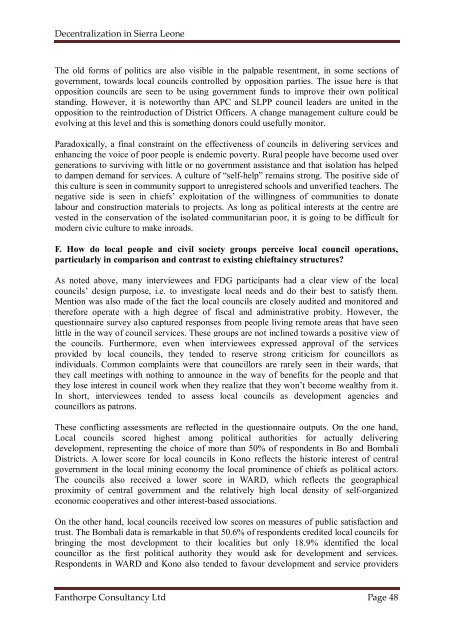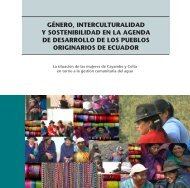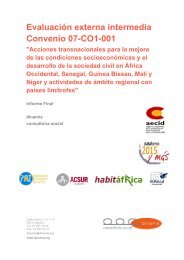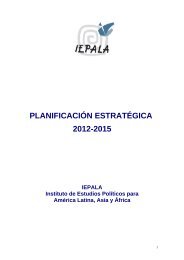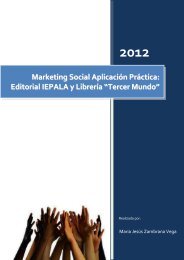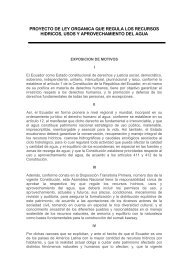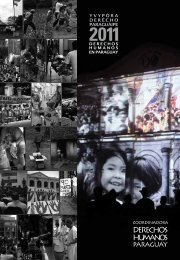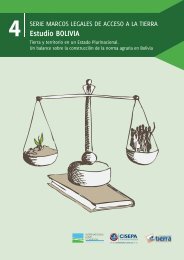Decentralization in Sierra Leone - Research for Development
Decentralization in Sierra Leone - Research for Development
Decentralization in Sierra Leone - Research for Development
You also want an ePaper? Increase the reach of your titles
YUMPU automatically turns print PDFs into web optimized ePapers that Google loves.
<strong>Decentralization</strong> <strong>in</strong> <strong>Sierra</strong> <strong>Leone</strong>The old <strong>for</strong>ms of politics are also visible <strong>in</strong> the palpable resentment, <strong>in</strong> some sections ofgovernment, towards local councils controlled by opposition parties. The issue here is thatopposition councils are seen to be us<strong>in</strong>g government funds to improve their own politicalstand<strong>in</strong>g. However, it is noteworthy than APC and SLPP council leaders are united <strong>in</strong> theopposition to the re<strong>in</strong>troduction of District Officers. A change management culture could beevolv<strong>in</strong>g at this level and this is someth<strong>in</strong>g donors could usefully monitor.Paradoxically, a f<strong>in</strong>al constra<strong>in</strong>t on the effectiveness of councils <strong>in</strong> deliver<strong>in</strong>g services andenhanc<strong>in</strong>g the voice of poor people is endemic poverty. Rural people have become used overgenerations to surviv<strong>in</strong>g with little or no government assistance and that isolation has helpedto dampen demand <strong>for</strong> services. A culture of “self-help” rema<strong>in</strong>s strong. The positive side ofthis culture is seen <strong>in</strong> community support to unregistered schools and unverified teachers. Thenegative side is seen <strong>in</strong> chiefs’ exploitation of the will<strong>in</strong>gness of communities to donatelabour and construction materials to projects. As long as political <strong>in</strong>terests at the centre arevested <strong>in</strong> the conservation of the isolated communitarian poor, it is go<strong>in</strong>g to be difficult <strong>for</strong>modern civic culture to make <strong>in</strong>roads.F. How do local people and civil society groups perceive local council operations,particularly <strong>in</strong> comparison and contrast to exist<strong>in</strong>g chiefta<strong>in</strong>cy structures?As noted above, many <strong>in</strong>terviewees and FDG participants had a clear view of the localcouncils’ design purpose, i.e. to <strong>in</strong>vestigate local needs and do their best to satisfy them.Mention was also made of the fact the local councils are closely audited and monitored andthere<strong>for</strong>e operate with a high degree of fiscal and adm<strong>in</strong>istrative probity. However, thequestionnaire survey also captured responses from people liv<strong>in</strong>g remote areas that have seenlittle <strong>in</strong> the way of council services. These groups are not <strong>in</strong>cl<strong>in</strong>ed towards a positive view ofthe councils. Furthermore, even when <strong>in</strong>terviewees expressed approval of the servicesprovided by local councils, they tended to reserve strong criticism <strong>for</strong> councillors as<strong>in</strong>dividuals. Common compla<strong>in</strong>ts were that councillors are rarely seen <strong>in</strong> their wards, thatthey call meet<strong>in</strong>gs with noth<strong>in</strong>g to announce <strong>in</strong> the way of benefits <strong>for</strong> the people and thatthey lose <strong>in</strong>terest <strong>in</strong> council work when they realize that they won’t become wealthy from it.In short, <strong>in</strong>terviewees tended to assess local councils as development agencies andcouncillors as patrons.These conflict<strong>in</strong>g assessments are reflected <strong>in</strong> the questionnaire outputs. On the one hand,Local councils scored highest among political authorities <strong>for</strong> actually deliver<strong>in</strong>gdevelopment, represent<strong>in</strong>g the choice of more than 50% of respondents <strong>in</strong> Bo and BombaliDistricts. A lower score <strong>for</strong> local councils <strong>in</strong> Kono reflects the historic <strong>in</strong>terest of centralgovernment <strong>in</strong> the local m<strong>in</strong><strong>in</strong>g economy the local prom<strong>in</strong>ence of chiefs as political actors.The councils also received a lower score <strong>in</strong> WARD, which reflects the geographicalproximity of central government and the relatively high local density of self-organizedeconomic cooperatives and other <strong>in</strong>terest-based associations.On the other hand, local councils received low scores on measures of public satisfaction andtrust. The Bombali data is remarkable <strong>in</strong> that 50.6% of respondents credited local councils <strong>for</strong>br<strong>in</strong>g<strong>in</strong>g the most development to their localities but only 18.9% identified the localcouncillor as the first political authority they would ask <strong>for</strong> development and services.Respondents <strong>in</strong> WARD and Kono also tended to favour development and service providersFanthorpe Consultancy Ltd Page 48


